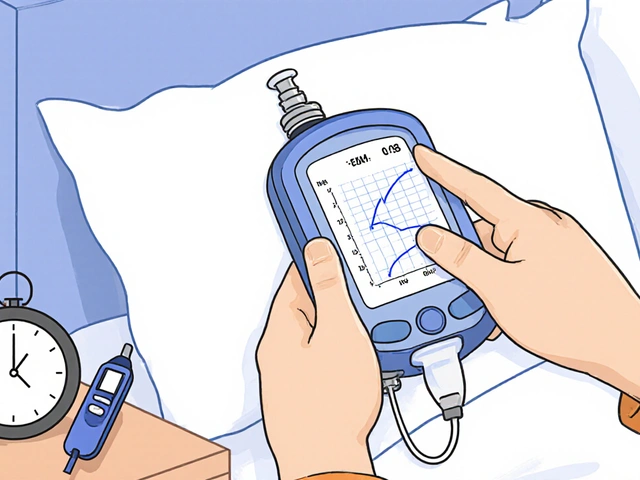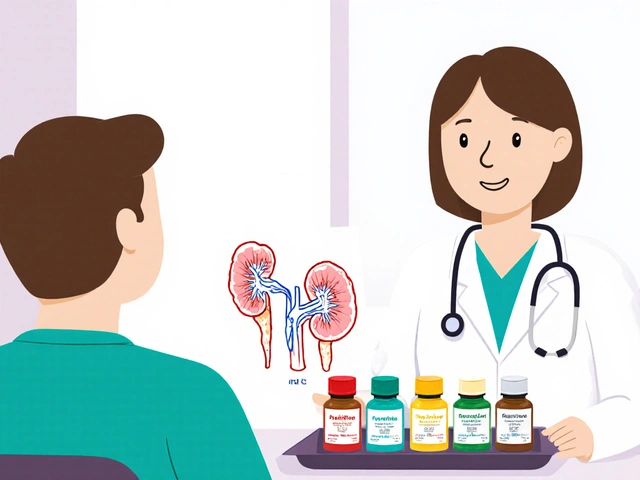Imagine waking up with a heavy, foggy head and an upset stomach. You brush it off, thinking it’s just another weird morning. But what if that queasy feeling in your belly is somehow tied to your mood or your ability to think straight? Scientists are no longer wondering—they’re following the clues. The reality is, your gut and your brain talk way more than you might think, and it's turning our idea of mental health upside down. What’s shaking up this conversation? Rifaximin, an antibiotic mostly known for taming bellies, is now being tested for its surprising side effects on the mind.
Gut-Brain Axis: Where Microbes and Moods Meet
The gut-brain axis isn’t just a fancy term for a one-way trip—it's a busy two-way street. Nerves, hormones, and actual tiny chemicals from gut bacteria constantly send updates back and forth between your intestines and your head. People who’ve battled IBS (Irritable Bowel Syndrome) have probably heard their docs mention this pipeline. But this isn’t only about stomach aches or running to the bathroom.
Let's unpack how this highway works. The main road is the vagus nerve. Picture a busy expressway, sending signals up from your stomach to your brain stem at lightning speed. But traffic isn’t just nerve impulses. Gut bacteria—millions of them, making up what’s called your ‘microbiome’—lay down chemical breadcrumbs like serotonin, dopamine, and short-chain fatty acids. Oddly enough, up to 90% of your body’s serotonin gets churned out not in your skull, but in your gut.
Now, when you change the mix of bugs in your belly, your body shifts right along with it. Kids with autism sometimes show different gut bacteria profiles. People with chronic anxiety often have less diversity in their gut ecosystem. Even mild stress tweaks your microbiome in as little as a day. Not convinced? Studies from Stanford and Harvard have tracked people with anxiety who started eating yogurt packed with probiotics. Their brain scans light up differently after a few weeks—their emotional centers calm down.
Here’s a wild fact that’s hard to ignore: doctors at the Mayo Clinic ran a trial with folks who had stubborn depression and IBS at once. Instead of handing out more antidepressants, they focused on gut health, using antibiotics and pro-gut diets. Over half noticed mood changes that paralleled their bowels improving. That's the gut-brain axis in action.
The buzz around gut health isn’t just marketing. When your intestines are inflamed, your brain knows. Cytokines (tiny signaling proteins) can cross the blood-brain barrier, the mind’s supposed “fortress.” Once inside, they poke the brain’s immune cells, sometimes fueling fogginess, fatigue, or even depression. So when something like rifaximin enters the scene, it’s more than just another digestive med.

Rifaximin: More Than Your Average Antibiotic
If you’ve ever been prescribed antibiotics, you’ve probably worried they’ll wipe out every useful bug along with the bad. That’s why rifaximin is so different—it acts almost like a ‘local cop’ in your gut without stirring up mayhem everywhere else. This drug barely gets into your bloodstream, so it skips the common whole-body side effects like rashes or dizziness. The FDA first green-lit rifaximin for traveler’s diarrhea, but now it’s a go-to for IBS with diarrhea and hepatic encephalopathy. Here’s where things get interesting.
Doctors started noticing that patients taking rifaximin for stubborn IBS not only had fewer trips to the bathroom—they reported feeling clearer, less irritable, and sometimes even less anxious. Is it a magic pill for mood? Not quite, but the intrigue is real. Columbia University ran a clinical trial where people with bloating, pain, and mild depression were given rifaximin or a placebo. On average, those taking the real deal felt both their stomach and their mind calm down. The difference wasn’t huge, but it was enough to rack up headlines.
What’s going on under the hood? Rifaximin doesn’t really get rid of all bacteria—it trims back just enough of the troublemakers, giving an edge to friendlier bugs. This rebalancing act slashes the levels of toxins known as ammonia and deactivates certain stress-triggering chemicals. That matters a lot if you’re dealing with hepatic encephalopathy (brain fog from liver disease). It also explains why some IBS patients feel more focused and less blue after a few weeks on this med.
The stakes? Nothing to scoff at. Roughly 15% of people worldwide struggle with IBS, and up to 60% complain of brain fog, anxiety, or mood swings. With rifaximin showing promise in both gut and mind, researchers are pressing for even bigger studies to pin down how long its effects stick and whether ‘maintenance doses’ are safe or smart.
One practical takeaway: rifaximin is not for everyone with a gut problem or a bad day. It’s expensive, and insurance doesn’t always play ball unless you prove you’ve tried and failed the basics. Plus, it’s not a ‘set it and forget it’ fix—your diet, stress, and sleep still matter big time. But if you’re in the tiny group of folks with IBS-D (diarrhea type) and lingering mental cloudiness, bringing up rifaximin with your doctor could open new doors.
Check out this quick reference list for who might benefit most from rifaximin:
- People diagnosed with IBS-D who haven’t improved with diet tweaks or standard meds
- Patients with liver disease and signs of brain fog (hepatic encephalopathy)
- Folks willing to monitor symptoms closely and avoid unnecessary antibiotic use
Here’s a breakdown of the potential benefits and side effects of rifaximin, based on recent studies:
| Benefit | How Often Seen (%) | Side Effect | How Often Seen (%) |
|---|---|---|---|
| Reduced IBS symptoms | 40-50 | Mild GI upset | 10 |
| Less brain fog | 20-35 | Headache | 5 |
| Improved mood (esp. in IBS-D) | 25 | Allergic reaction | 1 |
| Stable gut flora | 30 | Antibiotic resistance | Rare |
If you’re reading this wondering if your daily stress or sadness is tied to your stomach, science is starting to say “possibly.” If rifaximin whispers to your gut bacteria and those bugs shape your mood, you may be closer to the answer than you think.

Tips to Boost Gut-Brain Health—Beyond Medications
Let’s get practical. Even the most high-tech medicine can’t work in a vacuum, especially for something as complex as the gut-brain axis. If you’re looking for ways to give your microbiome a gentle nudge, there are plenty of choices that don’t require a prescription pad.
First up: feed your good bacteria. Prebiotic fibers are like fertilizer for the friendly bugs in your gut. You can find them in foods such as garlic, bananas, asparagus, and oats. Probiotics (the living bacteria themselves) are found in yogurt with live cultures, kefir, sauerkraut, and kombucha. There’s new buzz around psychobiotics—living bacteria that, when eaten regularly, may help with mood. A handful of small studies show people who ate these foods every day for a month had slightly lower levels of stress-hormones in saliva and a milder reaction to daily irritations. Keep it real—no magic potions here, just slow, steady changes.
Here are some tried-and-tested steps to support the gut-brain axis:
- Move your body, even if it’s just a 15-minute walk. Exercise helps friendly microbes bloom.
- Cut down on ultra-processed foods and artificial sweeteners. These can feed the wrong bugs.
- Prioritize sleep. Short-changing yourself even a few nights in a row can throw off your gut bacteria balance.
- Manage stress with whatever works: guided breathing, listening to music, talking things out. Your microbes react to stress just like the rest of you.
- Try not to overuse antibiotics. The more often you take them (unless truly necessary), the more you risk wiping out the delicate gut ecosystems you’re trying to protect.
For those with gut issues and persistent mood struggles, consider tracking your symptoms. Old-school food and mood journals actually work. Noticing a pattern—say, headaches or sadness after eating certain foods—can offer goldmine hints. There’s no one-size-fits-all answer, but seeing patterns might help you and your doctor make smarter choices about treatment options, including whether a targeted antibiotic like rifaximin is even worth considering.
If you’re curious about the science, stay alert for new research. In 2024, the American Gastroenterology Association highlighted two promising studies where people taking rifaximin saw changes in brain wave patterns linked to calmer, clearer thinking. The buzz is big, but so is the need for more proof.
One last tip: If you suspect your mind and gut are in a tug-of-war, don’t shrug it off. There’s mounting evidence your worries, sleeplessness, or even your bursts of creativity might be riding a current that starts way down in your intestines. Next time you’re contemplating a gut fix, remember—what happens below the belt can definitely make waves upstairs.






Bonnie Sanders Bartlett
I’ve struggled with IBS for years, and the mental fog was the worst part. I didn’t realize how much my brain was tied to my gut until I started eating more fiber and cutting out artificial sweeteners. It wasn’t magic, but over time, I felt calmer and clearer. This article finally put words to something I’ve felt but couldn’t explain.
Melissa Delong
Let’s be honest-this is Big Pharma’s latest distraction. Rifaximin is being pushed because it’s profitable, not because it’s effective. The gut-brain axis? A trendy buzzword to sell supplements and expensive antibiotics. They don’t want you to know that stress and poor sleep are the real culprits-and that’s easier to fix than buying a $300 prescription.
Marshall Washick
I read this with my mom. She’s had IBS-D since her 40s and has been on every diet under the sun. When she tried rifaximin last year, she said it was the first time in 15 years she woke up without that heavy dread. She didn’t say ‘depression’-she said ‘the fog lifted.’ That’s the kind of quiet transformation no study can fully capture.
Abha Nakra
I’m from India, and we’ve been using fermented foods like kanji and curd for gut health for centuries. No pills needed. The science here is just catching up to what grandmothers knew. Rifaximin might help some, but if you’re not eating real food and sleeping well, no antibiotic will fix your microbiome. Also, don’t ignore the emotional load-anger and anxiety change gut flora faster than any diet.
Neal Burton
How many of these ‘gut-brain’ studies were funded by pharmaceutical companies with stakes in rifaximin? The 20-35% improvement in brain fog sounds statistically significant, but clinically? Barely noticeable. And let’s not pretend this isn’t just another example of overmedicalizing normal human variation. People have always felt off after bad meals. Now it’s a neurobiological disorder requiring a prescription.
Tamara Kayali Browne
Let’s analyze the data. The study cited shows a 25% improvement in mood among IBS-D patients, but without a control group adjusted for placebo response, confounding variables like concurrent therapy or lifestyle changes are unaccounted for. Additionally, the sample size in the Columbia trial was under 100. This is preliminary. Overstating results as ‘groundbreaking’ is irresponsible.
Lori Johnson
My sister took rifaximin and said it changed her life-but she also started yoga and stopped drinking soda. So was it the drug or the lifestyle? I think it’s both. Don’t get me wrong, I’m glad she feels better, but let’s not pretend one pill is the answer. We need to talk about food quality, stress, and sleep-not just meds. And honestly? If your doctor won’t listen to you about your gut and mood together, find someone who will.
Tatiana Mathis
It’s remarkable how much we’ve underestimated the gut’s role in mental health. The vagus nerve isn’t just a pathway-it’s a conversation. And when we disrupt that conversation with antibiotics, processed foods, or chronic stress, the consequences ripple through our entire system. Rifaximin isn’t a cure, but it’s a tool-like a scalpel, not a sledgehammer. It targets precisely, and that’s why it’s promising. But the real breakthrough isn’t the drug-it’s the shift in medical thinking. We’re finally moving away from siloed specialties: gastroenterology, psychiatry, nutrition-all separate for too long. Now we’re seeing the whole person. And that’s what matters. If you’re struggling with both gut and mind, you’re not broken-you’re a system out of balance. And systems can be rebalanced. It takes patience, yes. But it’s possible.